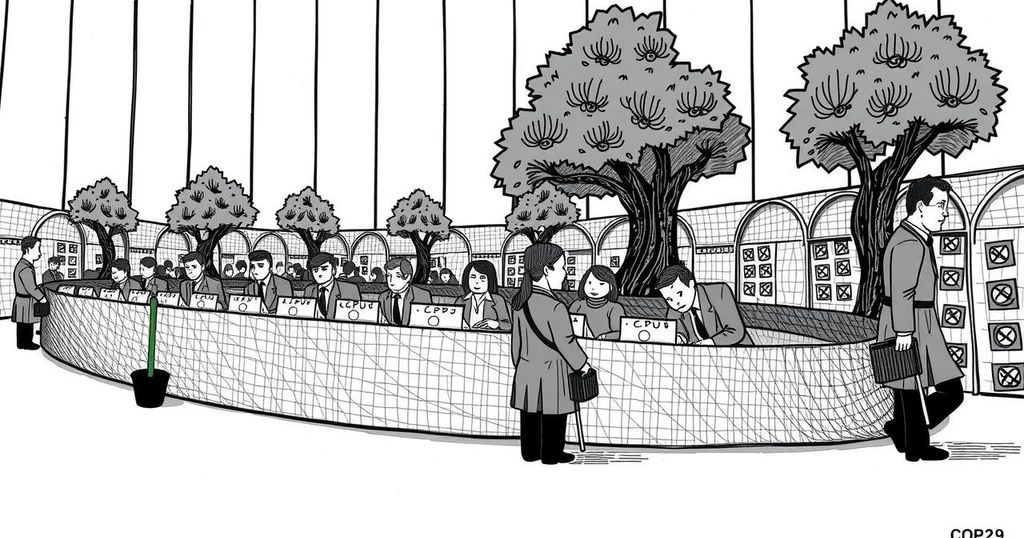COP29, hosted in Azerbaijan, reflected a severe crackdown on civil society with over 300 political prisoners. Despite calls for significant climate finance, repression against dissenting voices amplified significantly since Azerbaijan was selected as the host. Experts warned that this trend limits meaningful participation of environmental advocates in climate discussions, raising concerns about the potential neglect of human rights in global climate frameworks.
The recently concluded COP29, hosted in Baku, Azerbaijan, highlighted alarming trends regarding civic space and political repression. As civil society representatives criticized the inadequate climate finance commitments and the absence of actionable plans for reducing fossil fuel dependency, the situation for over 300 political prisoners in Azerbaijan remains dire. The country has seen a staggering 243% increase in political prisoners since being chosen to host COP29. This soaring number reflects a broader crackdown on dissent, where individuals who challenge human rights abuses and environmental degradation have either fled or been prosecuted under restrictive laws disguised as anti-terrorism measures.
The pressure on civic space in Azerbaijan has heightened significantly in the lead-up to COP29. Florian Irminger, President of the Progress & Change Action Lab, noted that the level of state repression had not been seen since Soviet times. As Azerbaijan embarks on its commitments from COP29, observers worry that the nation will struggle to support meaningful climate initiatives whilst simultaneously suppressing voices from civil society. The trend of hosting climate conferences in nations with restricted civic rights compromises the integrity of climate negotiations, leaving defenders’ perspectives marginalized.
There is a historical precedent of authoritarian states leveraging their hosting privileges to stifle environmental human rights defenders. Countries such as Qatar, Poland, Egypt, and the UAE have all demonstrated a pattern of intimidation and silencing dissenting voices during past climate conferences. Azerbaijan’s case is particularly concerning due to its small civil society sector, indicating that silencing only a few key figures can significantly impede criticism against the government’s actions.
Irminger’s organization has supported the Climate of Justice Initiative, which advocates for the intersection of human rights and climate justice in Azerbaijan. The recent arrest of prominent democracy advocate Anar Mammadli serves as a critical example of this repression. His arrest highlights the government’s intent to quash any dissent against its destructive environmental policies, especially following public protests against the negative repercussions of mining activities.
As states like Azerbaijan continue to reinforce their oppressive measures ahead of significant climate discussions, there is a pressing need for systemic change within the UNFCCC. Experts insist that the selection of host nations must be guided by their commitment to human rights and civic engagement. Moving forward to COP30 in Brazil, plans to elevate the participation of environmental defenders, notably Indigenous Peoples, are anticipated as crucial steps toward inclusive climate dialogue.
COP29 was the latest UN climate conference held in Baku, Azerbaijan. The conference faced severe criticism due to the government’s heavy crackdown on civil liberties, exemplified by the imprisonment of political dissidents. Since its selection as the host, Azerbaijan’s political prisoner count has dramatically increased, drawing attention to the stark contrast between the intended goals of such international meetings and the host country’s realities regarding human rights. This context is essential for understanding the challenges faced by climate activists and the potential ramifications for global climate policy as dissent is stifled.
The situation surrounding COP29 reveals the troubling intersection of climate negotiations and civic repression in authoritarian nations. As Azerbaijan continues to imprison critical voices, the integrity of global climate commitments is at stake. Without the inclusion of diverse perspectives from civil society, future climate conferences risk replicating detrimental patterns that undermine both human rights and climate action goals. Advocates are calling for a reevaluation of the criteria for hosting future COPs to ensure that civic space is protected and voices advocating for climate justice are endorsed.
Original Source: www.globalcitizen.org






